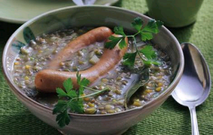GERMANY | Socializing | Cultural information
Mentality & Communication
Germans draw a big line between work and their spare time. At work personal relationships play a minor role, which makes them all the more important after work. Germans don’t like small talk and superficial relationships. They like close, reliable friendships. You can usually count on a German friend to do a lot for you out of friendship but he or she will also expect a lot in return (e.g. interest in their life, openness, remembering his or her birthday, etc.). Since Germans are usually slow to take the initiative and friendship is an important value, it is not easy to make German friends. But once you have some, they tend to be very loyal, reliable, and helpful.
Germans like to plan. That is also true in terms of their social life. It is common to make arrangements, often two weeks in advance, to meet at a certain place and time. Spontaneous visits or dates are the exception.
Invitations
Among students it’s common to get together to cook in the evening (Do not forget to bring recipes from your home country.) and to sit together and talk all evening long. In general everybody invited contributes some ingredients.
If you are invited, ask your host if you should bring something or what you should bring. If you are not expected to bring anything, it’s common to bring a bottle of wine or some snacks for dinner. If you receive a somewhat formal invitation, give a small present to your host, for instance flowers or some chocolates.
Going out to Eat or Drink
At restaurants or pubs people pay for themselves. If you get invited, you should return the treat at some other time.
Opening hours
Since Germans usually eat a warm meal for lunch and/or dinner, most restaurants already open in the morning around 11 a.m. and do not close until 11 p.m. Opening hours of pubs and bars vary. Some open early in the day while most do not close before 1 a.m. when the last patron leaves.
Local Customs
In the Catholic areas of Germany (Rhineland, Southern Germany) people celebrate Carnival (called Fasching or Karneval) in the “dark” season. Carnival starts on November 11 at 11.11 a.m. and ends with exuberant celebrations and a Carnival Parade on the Monday before Shrove Tuesday (end of February). Germans either love or hate Carnival but it’s worth immersing yourself at least once. To be admitted to a Carnival party you have to dress up in something. If you just want to watch the Carnival Parade, you don’t have to wear a costume.
Apart from Carnival, the many different regions of Germany celebrate a lot of other popular festivals and events such as wine festivals, fishing festivals, beer gardens, etc. For more information check your local paper and city magazines.
Typical local recipe

